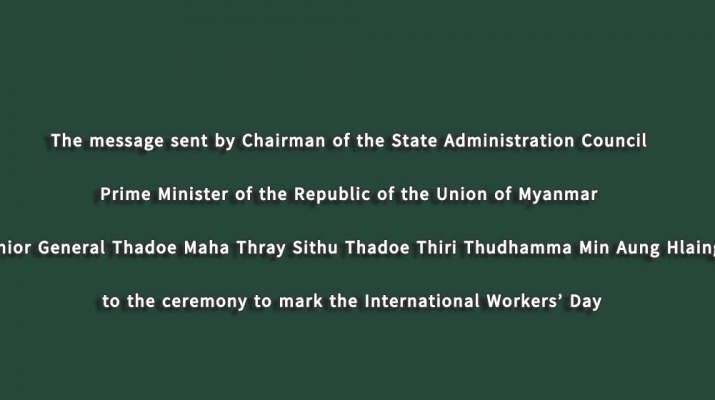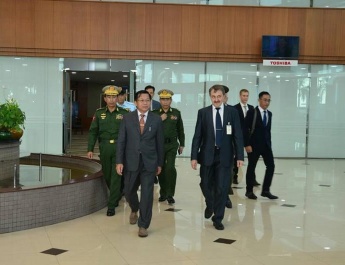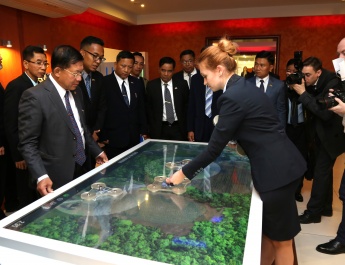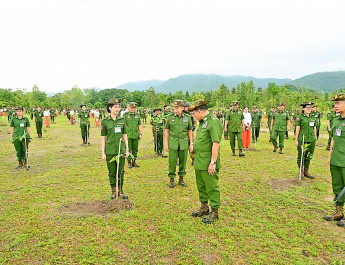(1 May 2025)
Esteemed workers,
International Workers’ Day is a historically significant day that emerged from workers themselves demanding their rights, and it is a historic day that is valuable for workers.
International Workers’ Day is celebrated in countries around the world annually on 1 May. In Myanmar as well, celebrations began on 1 May 1938. This day is observed each year to honour workers, who are a vital and essential force in the nation’s economic development. As of 1 May 2025, it will mark the 87th celebration of this occasion.
On this occasion of Workers’ Day, I extend my heartfelt greetings and best wishes for good health, peace of mind, and all-round prosperity to all the people, including the esteemed workers who are contributing their physical and intellectual strength with auspiciousness with perseverance, diligence, effort, and goodwill to the development of the nation and the betterment of socio-economic life.
The government is working to promote the State economy and improve the socio-economic well-being of the people by enhancing agriculture- and livestock-based production industries, and by supporting and promoting Micro-, Small-, and Medium-sized Enterprises (MSMEs) based on locally available natural materials in different regions. At the same time, efforts are being made to develop other economic sectors. On this occasion, I would first like to respectfully honour and recognize the hardworking labourers who are contributing to the national development.
Esteemed workers,
The government is promoting MSME (Micro-, Small-, and Medium-sized Enterprises) in order to increase domestic employment opportunities, reduce the unemployment rate, enhance domestic production, substitute imported goods, and enable the export of surplus local products.
The government, employers, and workers are continuing to collaborate to enhance the socioeconomic life of labour forces that play a vital role in national development, as well as to promote the development of human resources. Efforts are ongoing to upgrade vocational training schools to improve workforce skills, extend more number of training schools, to open more training programmes that provide greater employment opportunities, and to produce skilled workers who can compete not only locally but also internationally.
Esteemed workers,
To strengthen the role of workers in tripartite collaboration among the government, employers, and employees, the 2011 Labour Organization Law grants freedom to establish employer and worker organizations. As a result, 3,116 labour organizations and 28 employer organizations have been formed. These organizations contribute not only to increased production and national economic development but also to the protection and promotion of workers’ rights.
Inspections and regulatory measures are being taken at factories, workplaces, and departments to ensure that workers receive the entitlements granted under labour laws, and to promote occupational safety and health. Furthermore, to enhance workplace safety and health standards, the Social Security Board under the Ministry of Labour has established a national-level Social Security Board. In collaboration with both local and international organizations, Myanmar has been participating as a member of the ASEAN Occupational Safety and Health Network (ASEAN–OSHNET) since the year 2000.
Esteemed workers,
Since Myanmar is a member state of the International Labour Organization (ILO), it has been implementing and adhering to the conventions and recommendations prescribed by the ILO in accordance with the country’s existing laws. Likewise, Myanmar has been cooperating with the ILO in addressing complaints related to forced labour issues.
In accordance with ILO Convention No 182 on the Worst Forms of Child Labour, Myanmar is taking protective and preventive measures, as well as awareness-raising activities, to eliminate the worst forms of child labour. These efforts are being
carried out under the National Plan of Action for the Elimination of Child Labour, in line with existing laws.
The relationship between employers and workers should be good, ensuring a peaceful work environment and resolving conflicts in a fair and just manner. This will allow workers to quickly and fairly enjoy their rights. Therefore, the
establishment of 2,982 Workers’ Coordination Committees, 325 Township Coordination and Mediation Groups, 15 Conciliation Teams, and one Conciliation Council plays a significant role in facilitating resolution. By providing awareness programmes at factories and workplaces, not only can the relationship in the workplace be improved, but it will also contribute to increased productivity.
The social security plan is being implemented to ensure the social and health security of workers who are the main productive force of the country. Under this plan, insured workers from a total of 126 townships are entitled to medical treatment and financial benefits. Moreover, during the COVID-19 pandemic, insured workers were provided with social security benefits amounting to Ks-71,855.549 million (Ks-71.856 billion). Furthermore, a total of 3,394 insured workers who were affected by the flooding due to Typhoon Yagi received assistance amounting to Ks-266.297 million. For those insured workers affected by the severe 7.7 Richter-scale Mandalay earthquake on 28 March 2025, financial assistance for family support related to natural disaster risk is being planned, with an estimated amount of Ks-21,703.104 million (Ks-21.703 billion).
Esteemed workers,
Due to the shortage of workers in the country caused by the migration of workers abroad, it is necessary to focus on creating job opportunities within the country where there is a safer and more secure living environment, rather than encouraging more migration. Therefore, job fairs are being organized in some regions and states, where employers collaborate to provide a one-stop service for job placements. The Labour Exchange Management System has been developed to offer effective employment services and is available on the website. In sending Myanmar workers abroad, priority is given to countries with good wages and benefits. By comparing the number of workers who return after completing their contracted period with the number to be sent, efforts are made to create employment opportunities both domestically and abroad.
In order to ensure that Myanmar workers have access to overseas employment opportunities, to protect workers’ rights and prevent the loss of these rights, to systematically apply the experiences, knowledge, and skills gained from abroad for domestic use, and to contribute to the country’s development through remittances
sent by Myanmar migrant workers to their families via official channels, workers are being sent abroad in accordance with the law. To safeguard Myanmar workers abroad, labour attachés have been appointed in Japan, the Republic of Korea, Malaysia, and Thailand, while in countries without labour attachés, the relevant Myanmar embassies and consulate-general provide protection and support.
In conclusion, the government is implementing the Five-Point Roadmap and Nine Objectives set to foster the economic development of the country and improve the socioeconomic lives of its citizens. The role of workers is substantial in enhancing manufacturing sector through efficient utilizing internal resources and initiating the country to become an exporter transformed from the importer. The performance of the workforce is critical in achieving this goal. As such, I urge the workers to collaborate with the government to the best of their abilities, to serve the interests of the nation and the people in honour of International Workers’ Day.
Senior General Thadoe Maha Thray Sithu
Thadoe Thiri Thudhamma Min Aung Hlaing
Prime Minister
Chairman, State Administration Council





